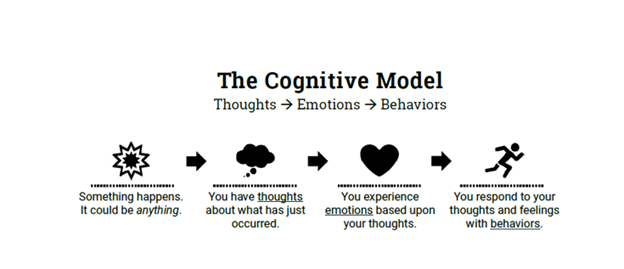Science-Backed Strategies to Overcome Negative Thinking
"The primary cause of unhappiness is never the situation, but the thoughts about it. Be aware of the thoughts you are thinking" Eckhart Tolle
''Men are disturbed, not by things, but by the principles and notions which they form concerning things''. Epictetus
''Nothing can harm you as much as your own thoughts, and, for many of us, this certainly is true''. Buddha
Are you noticing a pattern? All these quotes are trying to stress the importance of paying attention to the quality of your thoughts, as the thoughts you think ultimately will determine your destiny.
Watch your thoughts, for they become words
Watch your words, for they become actions.
Watch your actions, for they become habits.
Watch your habits, for they become your character.
And watch your character, for it becomes your destiny
Your brain is a three-pound universe that processes thousands thoughts each day using 128 billion neurons that connect at more than 500 trillion points through synapses that travel 300 miles/hour. The signals that travel through these interconnected neurons form the basis of memories, thoughts and feelings.
In this article, we’ll focus on your THOUGHTS and equip you with knowledge and tools to help you understand how you thoughts impacts the quality of your life and the results you can produce, thus helping you to get in the driver seat of your life.
The effective principle of Cognitive Behavioral Coaching (CBC) is this: what we think about a situation, affects how we feel about it and what we do as a result. As we can better understand and influence our habitual thinking patterns, we can have better control of our moods and behaviors. CBC approach develops an awareness of the habitually recurring thinking patterns that create your mood states and reactions to events, circumstances and others. As negative thought patterns and moods can be personally and interpersonally destructive, we equip you with tools to minimize the impact of your thoughts on your mood, relationships, and overall quality of life.
 This idea is helpful because it explains why people experiencing the same event can react in completely different ways, depending on the interpretation their mind jumped to.
This idea is helpful because it explains why people experiencing the same event can react in completely different ways, depending on the interpretation their mind jumped to.

We can always interpret a situation in different ways. This message was summarized most powerfully by Viktor Frankl, a psychiatrist and survivor of the Nazi concentration camps
Everything can be taken from a man but one thing: the last of the human freedoms is to choose one's attitude in any given set of circumstances, to choose one's own way
The meanings that we make affect the way we feel, and play a huge role in determining how we interact with other people and in response to everyday situations and circumstances. The interpretations we make about these events play a crucial role about the amount of stress we experience in our life.
Let's look at another example, let’s say someone cuts you off while you’re driving.
And let’s assume that your automatic interpretation is “What a selfish and impatient jerk.” The interpretation would probably make you feel somewhere in between being mildly frustrated to being angry or infuriated. Depending on the intensity of the feeling, the behavior that would follow could range anywhere from screaming at the other driver or going into a complete road rage.
The way it commonly feels to us is that our assessment of this ‘other driver’ is obvious, and anyone in their right mind would make the same assessment if presented with the same circumstances. But believe it or not, our interpretation was our own doing, and it wasn’t the only possible interpretation that we could have made.
The important thing to understand here is that the way in which we interpret our experiences determine both how we feel, and also the way in which we interact with the outside world.
In the same way that we wouldn’t marry someone only seconds after meeting them for the first time, we don’t have to use the first interpretation that pops into our head, either.
In the example above, the possible ways to interpret someone cutting us off are endless. How about this one: The person had unexpected car trouble and now is running terribly late to an interview. Or maybe their wife went into labor and needs to get to a hospital ASAP. Or perhaps this person was called at work and informed that their parent just had a heart attack? Or maybe their brakes have failed? The bottom-line you don’t know for a fact what is going on in the life of that person and what is the reason for their aggressive driving.
None of those interpretations are better or worse than any others in an absolute way. But which one leaves you able to go on about your day feeling less disgruntled? Most likely not your initial assumption of the other driver being a complete jerk. Right?
Now Let's Take a look at the Actual Strategies to help you get unstuck from the mental traps and stop your mind from imprisoning you!
From the previous article we have learnt about the most common mental traps we tend to fall into ( Get to know most common mental traps that are causing stress in your life ). And now you have a good understanding of how your thoughts can create feelings and influence your behaviors & interactions with others. Equipped with this knowledge, it’s time to look at the strategies to help you regain control of your mind, and ultimately your life.
“The world as we have created it is a process of our thinking. It cannot be changed without changing our thinking.” — Albert Einstein
Self-awareness is a component of Emotional Intelligence and can be improved through a process of monitoring and analysis ( learn more about the power of emotional intelligence)
To mitigate acting out our unconscious automatic negative thoughts, it’s important to become mindful of your thoughts instead of numbing or fighting them. First, the key is to notice automatic thoughts influenced by mental traps without getting caught up in their drama. The more you practice becoming aware of them as they arise, the less power they have over you. Once you become aware of your automatic negative thoughts, simply witness them with openness instead of with binding judgement.
Practice noticing your mental traps daily until this practice turns into an automatic habit. Every time you’re experiencing a mental trap, point it out to yourself. As an example, feeling anxious before a presentation at work. Are you telling yourself you’re going to fail? Are you thinking that if you fail this presentation, it will lead to a long line of failures and your whole career is at stake?
You can download Mental Traps Monitoring worksheet here (read more about Mental Traps & the impact they have on you) to help you develop self-awareness and become more mindful about mental traps you tend fall into and how your mood and behaviors are affected when you are imprisoned by your mind.
The rest of the strategies I share here fall under Personal competence and Self-management, a component of Emotional intelligence that allows you to observe your thoughts, be flexible with your emotions, and consciously direct your behavior to achieve the desired outcomes in life (Learn more about The Power of Emotional Intelligence).
Stop fighting reality and redirect your energy, attention, & nurture to things you want to grow in your life
Let me tell you a story that have changed my life.
I’ve heard this story about two wolves many years ago and since then I implemented this life-changing principle in my life and now I share this strategy with my clients.
In this story, a grandfather is sharing wisdom about life with his grandkids.
The story goes like this. There are two wolves inside us all battling to see who will take over. It is a terrible fight between two wolves.
The “BAD” wolf expresses anger, envy, resentment, greed, pride, outrage, judgment, sadness, criticism, and doubt.
The “GOOD” wolf expresses joy, appreciation, love, kindness, empathy, understanding, compassion, and humility.
This fight is going inside of every human-being, even if you don’t notice it.
“Which wolf will win?” — You may ask, as grandkids did. “The one you feed the most.” — the wise grandfather simply replied.
So which wolf do you choose to feed? Do you see that you have a choice? If you cling to your anger, how can you let go of it and feed instead the wolf of kindness and understanding?
This story was so profound and made so much sense. Just like at the end of every fairy tale the good always triumphs the evil. So, I thought the solution is simple feed the “good” wolf, and starve the “bad” one. I fell into the trap of trying hard to banish so called “negative” side of myself. I would force myself to be 100% "good" and perfect all of the times. I would beat myself up for being anything less than 100%. I tried to get rid of those negative thoughts in my head and those "bad" emotions like anger or sadness. BUT, no matter how hard I tried to starve the so-called “bad” wolf, I felt that the wolf was not going anywhere and it only became angrier and more resentful ( this is my story of Acceptance & Committed Action).
The reality is both wolves will always be there and both wolves are there for a reason. This applies to our emotions, behaviors, habits, and every other aspect of our life. You won’t be able to get rid of the “bad” wolf. And if you try to starve it, he will be hiding around every corner waiting for you to become distracted or weak and jump to get the revenge it craves.
Also, let’s remove the labels of “good” and “bad”, as nothing is good or bad in itself; but thinking makes it so. There is darkness and there is light. Both are necessary for us to engage with the experience of life in this universe. There is negativity and there is positivity. Just like electricity doesn’t exist with both a negative and a positive charge. We have two wolves inside of us: the wolf of “light” & "positive" and the wolf of “dark” & “negative”. The “positive” wolf has compassion, caring, and the ability to recognize what is in the best interest of all. But the “negative” wolf has many qualities, like tenacity, ambition, courage, fearlessness, strong will that we all need at times.
The truth is that none of us are living in pure bliss and we all go through hardships and experience unpleasant feelings. Personal growth is not about starving the negative wolf and trying to avoid feelings of anger or sadness. Personal growth is about accepting your entire self and learn to tame your wolves, so they support you in accomplishing your dreams and goals. Taming the negative wolf, not killing it — that’s how you neutralize your thoughts from causing misery and suffering. This was my revelation!
This is one of the main concepts of Acceptance Commitment Coaching (ACC), where you accept all your thoughts and feelings as they are. But, you are not allowing your thoughts and feelings direct what you do or don’t do. And you are able to make choices aligned with your values despite fears, doubts, and anxiety that might be present.
- Feeling unmotivated to workout, workout anyway, because you value being healthy and fit.
- Not feeling confident in your upcoming sales presentation, do it anyway, because it is important for you to share your passion about the product you have developed
- Not happy with your spouse, show them your love, because you value your family and want to show up as a kind and supportive partner
Remember that it’s so much easier to feed the negative wolf — this wolf is there to encourage you to stay in your comfort zone and play it small & safe. It’s easier to complain, procrastinate, dismiss, ignore, and give up. There is almost no effort required to do those things, and you’re getting the reward with the sensation of relieving and instant gratification without much an action.
The positive wolf is different; it takes conscious effort to feed it. It can be challenging and time-consuming to do things like learning, teaching, inspiring, sharing or simply sticking to a new behavior. These things take time and effort. And oftentimes you don’t see immediate results from them.
How you choose to interact with the opposite forces within you will determine your life. You can choose to starve one wolf or the other. Or you can see them as complementary interconnected and interdependent forces and learn how to guide both wolves within you. The choice is yours!
Detach yourself from your thoughts and stop the negative wolf from eating you alive
Thoughts seem so real and so powerful. We tend to forget that in reality, thoughts are nothing more than words and sounds in our heads. There is not really another person inside there. There is no one to argue with, and no one to win against. If a thought comes up like, “I am a bad person,” it can feel so true and so strong, and we can get lost in it. However, we can practice “stepping back” from our thoughts. We can remind ourselves, “I am having a thought that I am a bad person.” Or “ I’m noticing that I’m having a thought that I’m a bad person”. That thought is not you. Most likely, it is a sign that you are distressed.
‘'Defusion’' is a term coined by Acceptance and Commitment Therapy (ACT) to describe the ability to separate ourselves from our thoughts. On the contrary, ‘Fusion’ means getting caught up in our thoughts and letting them direct our behavior. In his book “ACT made simple,” Russ Harris defines ‘defusion’ as:
- Looking at thoughts rather than from your thoughts
- Noticing thoughts rather than being caught up in them
- Letting thoughts come and go rather than holding on to them
Thoughts do not control our actions unless we allow them to do so. Remember not to overfeed your negative wolf. Neither your thoughts nor your emotions can determine how you behave. You are not your thoughts.
We can’t escape from our thoughts and emotions, but we can decide what we do despite them. Remember, it’s about taming and guiding your internal wolves, not starving or killing them. You can be anxious and still do something that you set out for yourself to achieve.
Dr. Russ Harris provides a practical exercise to experience this concept first-hand. Try it out for yourself now.
Silently repeat to yourself: “I can’t lift my arm.” Say it over, over, and over again.
Now, Lift your arm as you continue to say: “I can’t lift my arm.”
So, you lifted it despite your thoughts, right? Hopefully, you are getting the point.
 You are so used to believing what your mind tells you it that can easily mislead you. Becoming aware that you are not your thoughts and emotions is the first step towards defusing their influence.
You are so used to believing what your mind tells you it that can easily mislead you. Becoming aware that you are not your thoughts and emotions is the first step towards defusing their influence.
You have thoughts and experience emotions, but they are not facts and don’t need to define who you are and what you can or cannot do.
Acceptance and Commitment Coaching (ACC) calls this a shift from self-as-content to self-as-context.
So, instead of feeling like we ARE the content of our thoughts, we can practice recognizing that we HAVE thoughts. You have thoughts, but you are more than just your thinking.
Acceptance Commitment Coaching uses a chess board analogy to illustrate this point.
If you identify who you are with your thoughts, it is like identifying with the chess pieces on a chessboard. You get very caught up in which side is going to win, obsess about strategy, get anxious about moves and countermoves, and get upset if you lose. However, without the chessboard, there could not be a chess game. You are more like the chessboard. Without you, there could be no thoughts. The chessboard is not affected at all by the outcome of the game. The board does not care who wins or loses, and is not scared by the battle.
So, how do we detach from our thoughts
- First, remember to use the following language anytime a distressing thought pops up in your head “I’m noticing that I’m having a thought that______”
- Second, you can close your eyes, step back and watch your distressing thoughts like you’re watching a scary horror movie. The first time you see a good, chilling movie, you are lost in the action, sitting on the edge of your seat, and jumping every time something frightening happens. However, after you have seen the same movie 100 times, nothing surprises you. It is easy to remember that it is just a movie, and it unfolds in the same way every single time it plays. You know what is coming, and you know that in reality, you are only watching flickering lights projected on a screen. The thoughts in your head are no more than electrical impulses in your brain. While you may have some very real things to deal with in your life, thoughts themselves have no power other than what we give them.
- Third, you can start observing your thoughts like clouds in the sky. Imagine that each thought you have is like a cloud in the sky and you mind is the sky itself. These clouds come and go during the day, some are white and fluffy, others are stormy and gloomy. In the same way your thoughts come and go, unless you give them your energy and attention, or start treating them as facts. Remember – You are not your thoughts!
So, when a negative thought “I’m never going to be able to do this? arises. You have a few choices. Give your attention to that thought and fuel it by believing it is true “here is why I can’t…” , thus spiraling down into the negative cycle. Or simply observing your thoughts like a movie or a cloud. “I’m noticing a thought that I’m never going to be able to do this”. Don’t agree or disagree, simply notice and let it float by and be replaced by another thought.
This is a very effective technique that can help you challenge irrational, illogical, or harmful thinking habits and redirect your attention towards valued actions, thus giving you control of your life. The basic outline for this technique is to ask the following questions that are grouped in 2 parts:
part 1. Helps you relabel and reframe your irrational and negative thoughts
- Is this thought true?
- Is this thought realistic?
- Am I basing my thoughts on facts, opinions, or on feelings?
- What is the evidence for this thought?
- Could I be misinterpreting the evidence?
- What is the evidence against this thought?
- Am I viewing the situation as black and white when it’s really more complicated?
- Is there another explanation or another way of looking at things?
- Am I having this thought out of habit, or do facts support it?
Part2. helps you redirect attention to the valued action path
- Does having this thought serve me?
- Does this thought help me achieve my desired outcomes?
- Does this thought motivate and inspire me?
- Is this thought kind to myself and others?
- Who would I be without this negative thought?
- What advice would I give to a friend who had this thought?
- What do I really want to feel or create in the situation? What thought/s can help me move towards that?
After you answer these questions, you almost certainly will see that there are other ways to view the situation and better actions you can take that will bring you closer to the desired outcomes and the life you love.


